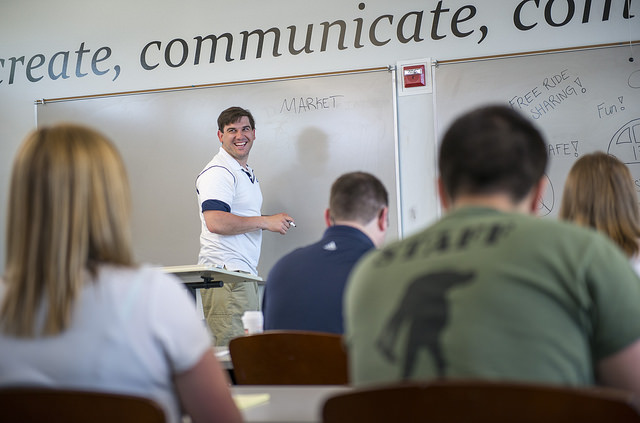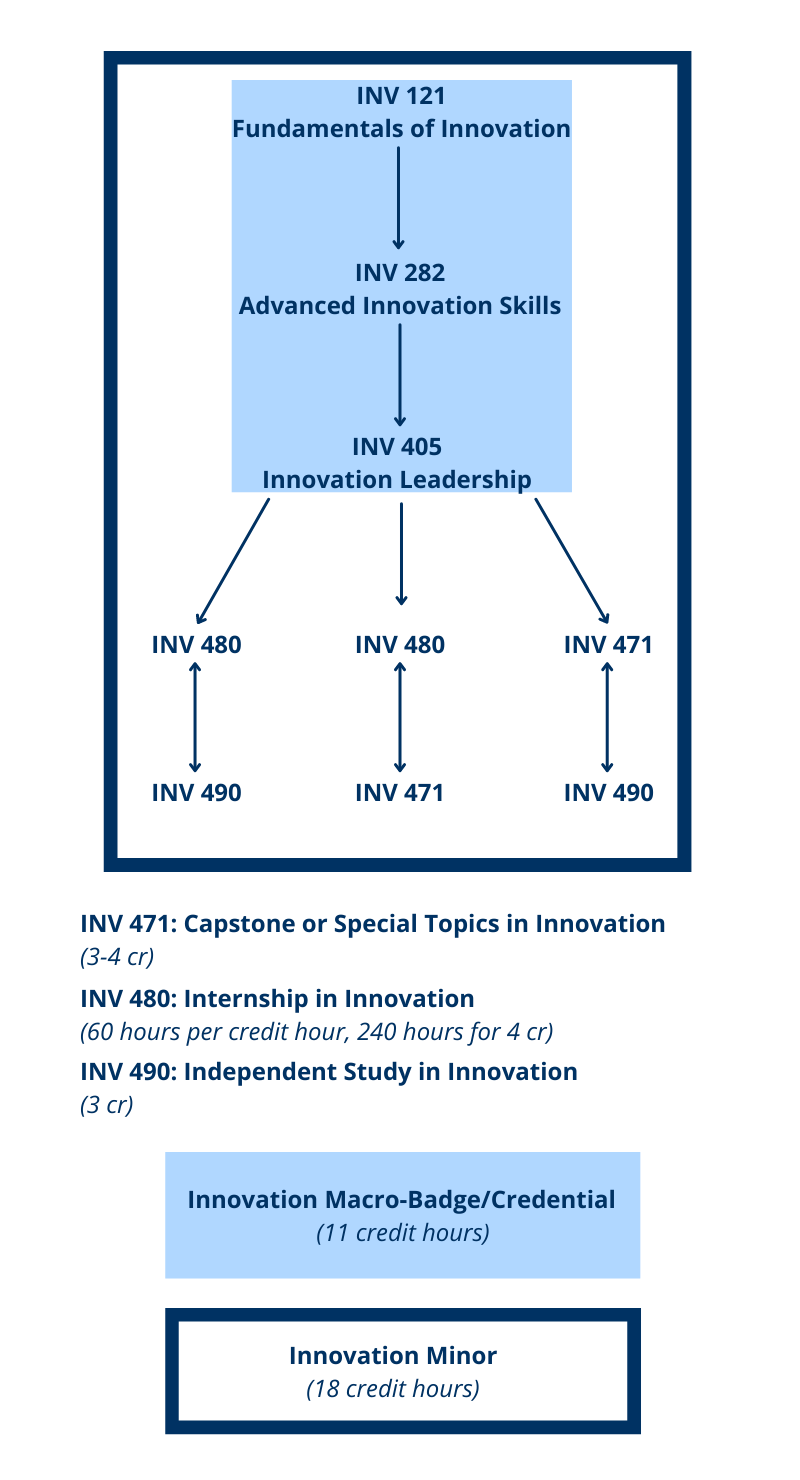
Course Pathways
Micro-Credential & Minor in Innovation
INV 471/480/490 can be cross-listed with existing academic unit internship and capstone courses to complete the minor. Students must receive at least a C- in all courses to complete the minor.
Example 1: Student majoring in Construction Engineering Technology would complete INV 121, 282 and 405 and then could cross-list CET 458, Capstone, and CET 394, internship, with INV 471 and 480 respectively without enrolling in these innovation courses to complete the Innovation Minor.
Example 2: Student majoring in Food Science would complete INV 121, 282 and 405 and then could cross-list FSN 520, capstone, and FSN 396, internship, with INV 471 and 480 respectively without enrolling in these innovation courses to complete the Innovation Minor.
Course Descriptions
INV 101: Exploring Innovation
Credits: 1
Prerequisites: none
This course is designed for students who are interested in finding out more about innovation, especially as it relates to startup businesses. The course will introduce ways of stimulating creativity, emphasize working in diverse teams and problem-solving to increase speed and decrease risk when it comes to innovation and new business opportunities. Students will 1) learn what is innovation and how to use a simple metric to identify innovation, 2) see/hear about applications of innovation in a variety of fields, 3) learn how to make smart decisions for investing in innovation.
INV 101 is used as a portal to the Innovation Engineering ® curriculum and can be used to start Undergraduate Certificate or Minor in Innovation Engineering. This course is typically used as an elective in other programs.
INV 121: Fundamentals of Innovation
Credits: 3
GenEd: Social Contexts & Institutions, Artistic & Creative Expression
Prerequisites: none
Regardless of one’s field of study, students need to be able to identify problems and generate solutions, communicate these solutions effectively, and test and implement them successfully. This course uses the Innovation Engineering system to incorporate these skills and teach students how to rapidly innovate and solve everyday problems. This course is designed to provide a complete overview of the Innovation Engineering ® system. INV 121 introduces students to core skills needed to earn a Minor in Innovation.
INV 282: Advanced Innovation Skills
Credits: 4
GenEd: Demonstrated Writing Competency requirement and Quantitative Literacy
Prerequisite: INV 121
This course will provide students with advanced skills in Innovation and a systematic approach to creativity, communication, bringing their idea to reality (commercialization) and systems thinking. In the first set of advanced skills (create), students are provided with theories behind and practice using tools to generate meaningfully unique ideas. These tools engage creative stimulus, diversity, and mining for technology and economic, social and cultural trends. The second set of skills (communicate), combines elements of several disciplines: the clarity of professional writing, the precision of technical writing, and the expressiveness of creative writing. The third set (commercialize), how do you quantify its risks and benefits? How can you reduce the unknown quantities in your process of creating and realizing? Students learn to apply principles of the scientific method and design of experiments for evaluating ideas and making them real. The fourth set of skills (Systems), students will learn how to visually map the system, measure variation, and analyze system performance to understand opportunities for Innovation.
INV 405: Innovation Leadership
Credits: 4
GenEd: Social Contexts & Institutions
Prerequisites: INV 121 and INV 282
Students will learn how to apply the tools and strategies learned in earlier courses into a more advanced systems approach to innovation. Through this process, students will learn to lead systems for building alignment, collaboration and capacity to generate and implement new ideas in a wide range of organizations. Students will then apply concepts explored in Innovation Engineering with the purpose of creating students’ own project proposals. Students will be expected to identify a problem or opportunity and to research existing solutions to the problem before developing their own ideas and testing the idea using iterative cycles to help ensure success of the idea.
INV 471: Special Topics in Innovation
Credits: 3-4
Prerequisites: N/A
Provides opportunities for reflective and theoretical approaches to topics in innovation. Topics might include: innovation and medicine, finding money for innovation, universal design and innovation, innovations in aquaculture.
INV 480: Internship in Innovation
Credits: 1-6
Prerequisites: N/A
With submission of proposal approved by the curriculum committee and Innovation Area Coordinator, students working as interns with public or private sector organizations on projects aimed at innovation may register for credit hours. May be repeated for credit up to six credit hours.
INV 490: Independent Study in Innovation
Credits: 3
Prerequisites: N/A
With approval of curriculum committee and director of academic program, students may create a plan of study for one semester with the guidance of a faculty member in Innovation.
